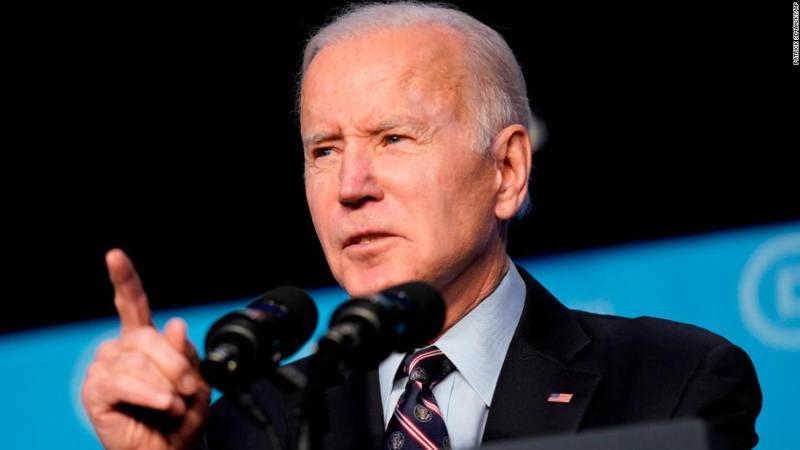Biden's approval rating rises following Russian invasion of Ukraine - CNNPolitics



(CNN)The Russian invasion of Ukraine is playing out on social media and television in ways no European war ever has. The whole world has seen the violence and devastation of the biggest war in Europe since World War II.
The invasion has helped to shape and reshape opinions around the world and here at home about Russia, Ukraine and even political leaders not directly involved in the conflict. It's also affected gas prices. With that in mind, let's take a brief look about how things have changed domestically. We'll start with President Joe Biden's popularity.
Biden may have gotten a small "rally around the flag" bump
Biden's approval rating was at one of the lowest points in his presidency heading into the end of February. Then Russia invaded Ukraine and Biden held his State of the Union address. Read More There has been some polling (mainly from the Marist College/NPR/PBS NewsHour survey) that indicated that Biden's approval rating rose by 5 points or more in response. Looking at all the polling conducted in the aftermath of the Russian invasion shows that Biden may have received a small bump, but not the big bounce Marist found. Specifically, Biden's approval rating stood at about 42% in an average of all the pollsters who did a post-Russian invasion poll. These same pollsters had Biden's approval rating at 40% in their polls taken before the invasion. Biden seeing some sort of rise makes sense given that his approval rating over his handling of the crisis is higher than his overall job approval rating. In a recent Quinnipiac University poll, his overall approval rating stood at 38% and his disapproval rating was 51%. The same poll put Biden's approval rating at 42% and disapproval rating at 45% over his handling of the Russian invasion of Ukraine. Still, Biden's on the wrong side of the ledger. His disapproval rating overall in the average of polls is about 51%, which makes for a net approval rating of -9 points. The fact that Biden received a small bump would comport with previous studies on the rally-around-the-flag effect. They tend to be small during times of international crises without a full-out war involving the US. Additionally, most polling has indicated that Americans are worried far more about inflation and the economy than this war. Anything that causes Americans to shell out more money (such as rising gasoline prices) could, in fact, have a negative effect on Biden's popularity. Perhaps, the bigger question is what happens from here. Biden's approval rating dropped quickly after the withdrawal of US troops from Afghanistan. Americans didn't list the withdrawal as one of the top issues and the initial polling decline only accelerated in the weeks and months following that decision by Biden. It's plausible that any bump we see in Biden's ratings right now could go up in the weeks and months to come. Of course, Biden's slight boost may be momentary before settling again.
Gas prices aren't historic yet, but it's still tough for many
You're reading headlines right now about how a gallon of gas costs more than it ever has. That's true. The average price for a gallon of gas was $4.33 on Friday, which is higher than it was in 2008 when it was $4.11. Keep in mind two important things, though. First, inflation is way up. We may reach the point where gas is more expensive now than in 2008, when taking into account inflation, though we haven't yet. When taking inflation into account, the average price for a gallon of gas at its peak in 2008 was $5.30. Another way of looking at it, as the University of Michigan's Justin Wolfers did, is to understand how much a gallon costs per time worked. At its peak in 2008, it took about 13.5 minutes of work for the average worker to buy a gallon of gas. Right now, we're under 10 minutes (as of Thursday). Prices right now are more comparable to where they were in 2014, by this metric. Second, fuel efficiency in cars is somewhat higher. On average, you're getting a mile or two more per gallon than you did in 2008 or 2014. That might not seem like a lot given that the typical midsize sedan gets around with a 14-gallon fuel tank, but it does add up over time. As former Treasury Secretary Larry Summers put it, the price to drive 100 miles (given fuel standards and inflation) was, as of this past Monday, still more than 5 bucks cheaper than it was in either 2008 or in the early 1980s. I tend to doubt, though, that any of this is much comfort to many Americans. When asked how many paychecks they could miss and still be able to pay their bills, 54% said two or less in a 2019 Fox poll. An NORC poll from that same year found that 51% believed they could miss one paycheck or less before having to cut back on necessities, if they didn't dip into their savings. The bottom line is it's going to be tough for a lot of Americans right now. That's a sacrifice, however, that many Americans indicate they're willing to make. The latest Quinnipiac poll found that 71% of adults were willing to support a ban on Russian oil imports, even if it meant higher gas prices. This included the vast majority of Democrats, Republicans and independents. We'll see if that holds after a few weeks of higher prices.





Can you spell R E B O U N D? President Biden can...
I do not believe it will be enough to help the Democrats in November. I think there are still too many issues for this modest bounce to make up for and November IMO is going to swing both houses of Congress to the Republicans.
40 percent to 42.
can you spell margin of error?